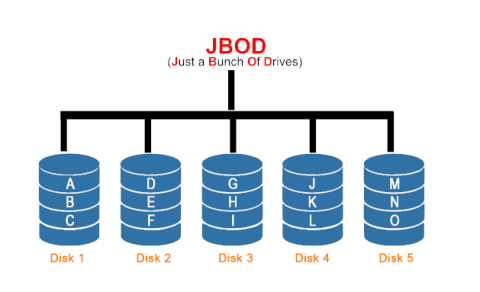JBOD (Just a Bunch of Drives)
If you have been dealing with hardware storage configuration, you may have heard the work JBOD along with RAID. JBOD stands for Just a Bunch of Disks or Just a Bunch of Drives. Either way it is a multilevel configuration of disks, be it HDD or SSD.
JBOD is a collection of disks so when assembled are regarded as one logical volume. It is still a form of RAID in a sense that the data is stored redundantly in several disks that are set together to form one logical unit or LUN
As mentioned earlier, companies have the option to go JBOD or RAID, so when is the usage of JBOD is preferable to a RAID configuration? I will be making side by side comparison of JBOD and RAID in a letter article, but here, I will rather focus on when to use JBOD by laying out its advantages and drawbacks.
How does it work?
JBOD does its magic by turning combined drives in to a LUN and then filling them with order through a process called spanning. Think of a multilevel water fountain, the water will flow to the level bellow only when the level above is full.
When to "JBOD"
JBOD should be considered when there is a need for an efficient and cost-effective storage method preferably for on-prem storage. Unlike RAID 0 for example, JBOD allows the full utilization of every single disk the array.
When dealing with JBOD, disk size's parity is also not a requirement meaning you can mix and match different drive sizes. A 2TB and a 16 TB drives can be combined to make a 18TB storage capacity.
Examples
- RAID 0: 1 x 1TB + 1 x 2.5TB + 1 x 2TB = 3.5TB (Lot of wastes)
- JBOD: 1 x1TB + 1 x 2.5TB +2TB = 5.5TB (No waste, Full capacity)
When not to "JBOD"
JBOD is not meant to hold primary data but rather as a temporary backup due to its lack of reliability and redundancy. In fact, if a disk containing data is damaged, the data is permanently gone and a failure of a disk in the array end up killing it.
It is important to note that JBOD does not convey the advantage of fault tolerance or performance improvement, therefore it is not advisable to implement JBOD when looking for data integrity for high availability.
Also unused disks in a JBOD are just a waist in term of capacity and energy usage and each new disk added create a potential point of failure. It is also worth mentioning that you have no performance improvement when it comes to Read and Write.
I have heard people claiming that JBOD are hot swappable. I wouldn't advise that
When you subscribe to the blog, we will send you an e-mail when there are new updates on the site so you wouldn't miss them.


Comments